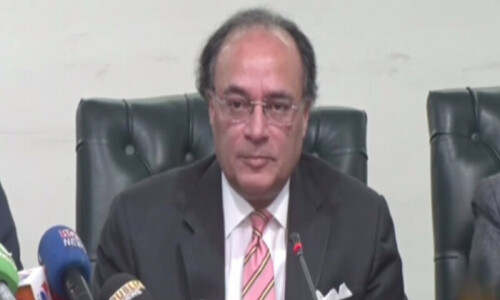THE arbitrariness of our policymaking process has been very evident in our latest decision to expel hundreds of thousands of Afghan migrants. For decades, we hosted millions of refugees who were fleeing war and devastation. And now, suddenly, they are being told to leave. Many of them were born and grew up in this country and now have nowhere to go in their native land.
The draconian decision has already forced some 200,000 Afghans to leave, while many more are being kept in holding camps near the Afghan border for repatriation. Recent days have witnessed some harrowing scenes of Afghans being hauled up by the security agencies after the expiry of the deadline for undocumented Afghan nationals to leave voluntarily.
There are some 1.7m undocumented Afghans out of more than an estimated 3m living in this country. Many of them have been here for the past four decades. There has been a constant inflow of refugees since the 1980s following the Afghan war against the Soviet occupation. Porous borders allowed the influx of refugees.
The policy of, first, supporting the American-backed mujahideen war in the 1980s and then aiding Taliban who were fighting the American forces facilitated cross-border movement at the cost of the country’s own national security. Being the front-line state during the two Afghan wars in the past four decades made Pakistan the main destination of Afghans affected by the fighting.
The scapegoating of Afghan migrants won’t cover up our policy flaws.
Another influx of refugees came after the end of the 20-year-long US-led war in Afghanistan. Over half-a-million Afghans have crossed over to Pakistan after the return of Taliban rule in 2021. While most of them are economic migrants, there have been others fleeing the country to escape persecution by the conservative regime. They include women and human rights activists.
Apparently, there were no restrictions on border crossings at that time, allowing the free movement of refugees. They formed the bulk of the undocumented Afghan refugee population. A large number of the new arrivals were seeking asylum in Western countries. Their forced return to Taliban-controlled Afghanistan may put their lives at risk.
Pakistan’s arbitrary policy decision has led to a very serious humanitarian crisis. The forced repatriation of some 1.7m people to a food-insecure country where poor living conditions have been exacerbated by floods and earthquakes will make the lives of the returnees extremely perilous.
Women and young girls will be most affected by the Taliban regime’s restrictions on female education and work. They will have no future living under a harsh conservative regime.
In the past too, Pakistan has tried to repatriate undocumented Afghan refugees but never on this scale. Interestingly, such a critical decision affecting the country’s internal and external security has been taken by a caretaker government, which is not constitutionally mandated to take long-term policy decisions.
It should have been left to the future elected government and parliament to make policy on such a sensitive issue, which has long-term national security and foreign policy implications.
It is, however, obvious that such decisions cannot be made without the approval of the security establishment. It is claimed that the mass expulsion of non-documented refugees is being driven by national security concerns, including the rising number of attacks by the TTP on Pakistani security installations and forces.
Pakistani authorities have often alleged that the outlawed militants are operating from across the Afghan border. The situation appears to have worsened with the Afghan Taliban administration refusing to act against the militant sanctuaries on their soil.
There have also been some reports of the involvement of Afghan Taliban factions in some of the terrorist attacks. All that has strained Islamabad’s relations with the regime in Kabul. But this does not provide a justification for the reckless and thoughtless decision to expel the entire Afghan refugee population. Even if we succeed in pushing all of them across the border, it will not make Pakistan any safer as is being claimed. In fact, it will create more problems.
Indeed, the TTP leadership is still based in Afghanistan but the spurt in terrorist attacks is largely the result of our own flawed policy that allowed thousands of armed militants to return under a deal brokered by the Afghan Taliban. They may be getting help from across the border but the attacks are being carried out by the militants based inside the country.
It is true that the increase in militancy poses a very serious security challenge and must be dealt with sternly. But the scapegoating of Afghan migrants won’t cover up our policy flaws. Expelling poor Afghan women and children will not resolve the problem. Moreover, the country doesn’t have the administrative capacity to expel such a large refugee population.
Pakistan insists that its action against undocumented migrants is not Afghan-specific, is in accordance with international norms, and doesn’t affect refugees living here legally. Islamabad insists that the decision applies to all illegal immigrants. But it is a fact that the overwhelming majority of those affected by it are Afghan nationals.
Rights organisations dispute the government’s decision, pointing out the harsh economic and human rights prevailing in Afghanistan under the Taliban administration. There have even been reports of the harassment of documented refugees by the security agencies.
There can be no two opinions that Pakistan needs secure borders and should stop undocumented entries. But over the past several decades, we have left our borders wide open because of geopolitical reasons. Now we have taken an abrupt decision to throw out all undocumented migrants. Not only will this be near impossible to implement, it will also create serious problems for our internal and external security.
The political fallout of this flawed decision is already apparent in the public protests against the action in KP and parts of Balochistan. Meanwhile, the move is bound to further strain our ties with Afghanistan. There is still time to correct the missteps before the situation goes out of control.
The writer is an author and journalist.
X (formerly Twitter): @hidhussain
Published in Dawn, November 8th, 2023















































